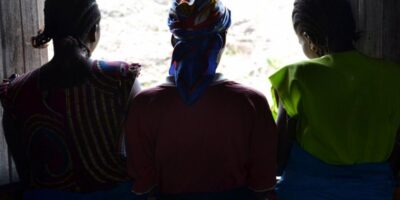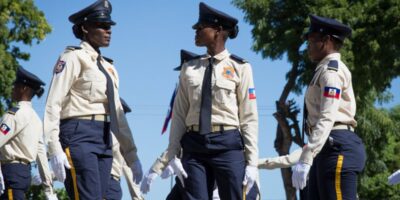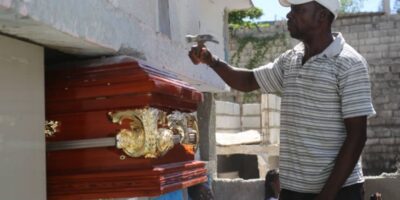If according to the government, everything is under control, sociologist Djems Olivier, who has conducted research on gangs in Haiti, describes a new form of terrorism in an interview with AyiboPost
Lire cette interview en français
On August 20, 2022, a dozen people, including four members of the same family, were killed and then torched in Tabarre.
A few days earlier, on August 6, the former Senator of the Republic, Yvon Buissereth, suffered a similar fate in Laboule 12.
The list could go on, going back further in recent years.
In La Saline, in 2018, during what would be enshrined as the first massacre of La Saline, dozens of bodies were burned by bandits who had attacked the neighborhood.
However, speaking at the United Nations on September 26, the Foreign Minister of Haiti, Jean Victor Geneus, who denounced the “people who were taking advantage” of the chaos in the country, said the situation is “generally under control”. He made the statement against a backdrop of growing anti-government protests, high inflation and a predicted humanitarian disaster. More than five million Haitians await urgent assistance, while gangs continue to strangle the country and burn the bodies of their victims.
In this interview with AyiboPost, sociologist Djems Olivier, who has conducted research on gangs in Haiti, describes a new form of terrorism, although these practices are not new.
AyiboPost: We have the impression that gangs are becoming more and more aggressive, especially with the use of fire on the bodies of their victims. Are these new practices which show an evolution of the gangs and their methods?
Djems Olivier: I don’t think this is new. Gangs have always tortured their victims, alive or dead. For example, gangsters have used plastic bags to burn the body parts of people they have kidnapped. They cut off the heads of policemen, and even rival gangsters and put them on a plate… They eat the opponents’ penises or other parts of their bodies… In fact, these are all attempts to create terror by showing their level of brutality. It’s all about scaring people and letting them know that this is what’s in store for them.
Burning the bodies, for me, is part of this desire to frighten. There is a form of terrorism that is growing in the country even though we are afraid to call it by its name. And one of the most effective ways to spread this terror is through social media.
There is also a magico-religious aspect, because by making the bodies disappear, they believe that the victims’ relatives cannot attack them “mystically”. But the most scientific explanation is the need to terrorize.
As I said, these are practices that have been going on for years. We could go back to 2004, when gang leaders like Jeneral Toutou were putting marbles on their penises to rape women, taking pleasure in seeing them suffer.
But you can also go back much further than 2004. I still remember the first time someone was burned in front of me. I was still a kid, and it was in a municipal section of Corail, where I grew up. It was the zenglendo period. A man who had been identified as a zenglendo was burned alive by the population.
Does this mean that the violence we are talking about is not just the work of the gangs?
Rather, it can be seen as part of a dynamic that has led to the creation of gangs. Self defense brigades are one of the origins of many armed groups in the country. They are young people who live in a neighborhood, who wanted to protect it, after Duvalier, against death squads, against zenglendo, and paramilitary groups like FRAPH. These groups became a clientele for politicians, and many have turned into gangs.
Is there a connection between this increased violence and the fact that more and more young people are joining gangs, perhaps to prove that they are worthy?
Yes, this is also the case. But you must understand that joining a gang sometimes comes from a need for protection. The young person has no reference points, he has an identity problem, he feels excluded, so he turns to these groups to protect himself, even economically, and to find recognition. The gang becomes a way for him to get respect. Respect is important in these gangs. So, the young person who is in the neighbourhood joins a gang and finds their way of being talked about.
Why not join the national police force, given that some police officers place a high value on being a “leader”, and as such deserve the respect we are talking about?
The PNH is too formal. Recruitment is based on a competition; there is a selection process well before the examination, and not everyone is lucky enough to be accepted. And even after the selection, the institution can investigate your past, and if there are unclear elements, they may not keep you. With gangs, it’s different, everyone is accepted. A gang also has standards that govern it, but not as much as the police. And one of those standards is respect, obedience to the leader.
Today, it seems that gangs want to create a space for their “soldier” to grow. It’s not like it used to be. We remember that in 2014, [the gangster] Ti Kenkenn was killed by one of his soldiers. And this one had clearly said that it was because the former leader was keeping everything to himself. The gang leaders have figured this out now, and there is a form of redistribution of the loot. Don’t think they are stupid. They know what they are doing.
This is why some of the methods used by the government to break up gangs no longer work. In the past, celebrities, famous foreign artists, etc. would go into the neighborhoods and meet with the gangsters. But this was a way to eliminate them. Nowadays, this is not done anymore. Some of them now hide their identity, mask their faces, etc. It’s like they have trained people advising them. My experience as a researcher has shown me that sometimes gang leaders who receive foreign journalists ask soldiers to come out. They have one language for the soldiers, and another for the foreigners.
So far, you say, we don’t see these events as domestic terrorism. Perhaps because what we know of “terrorism” comes from television, and it’s people planting bombs, etc. Do you fear that this terror will develop, to match this depiction we have of terrorism?
We are moving towards that. We don’t have any kamikaze actions yet, and I hope that doesn’t happen, but we are living terrorism. What happened recently on the Tabarre bridge, where a family was wiped out, is terrorism. It may be just the beginning, but we are going there, with all these gangs that control the capital, the cities in the countryside, and which may have other ramifications. It is by the degree of their violence that we notice them. Sometimes, they also claim responsibility for their actions, if we remember what happened in Laboule with the police. This is terrorism.
Isn’t it ironic that these same gangs who are afraid of being hurt in a mystical way, are also the ones who desecrate some sacred places such as peristyles, which they sometimes loot, or who kill voodoo priests?
Yes, there is a contradiction. But let’s take the case of a bandit who has been given the gift of not taking bullets. If it works for him, why wouldn’t it work for other people? Why shouldn’t Christians, for example, have a prayer that limits the actions of gangs? This is the limit of the magico-religious dimension. We are Haitians, it is true, and we understand this cultural perspective, but there is a limit. We must also avoid falling into the trap of accusing the oungans (Vodou priests) of protecting the gangsters. This could open the door to violence against practitioners of Vodou.
Self-defense brigades are one of the sources of gang creation. But today, the country is very armed. There are a lot of weapons in the neighborhoods. Is there not a possibility that what we are experiencing today, the “lock” periods, will lead to that as well? Maybe some neighborhoods will lock down not to keep their residents out, but rather to stop other people from coming in and causing trouble?
The current situation is frightening. The same groups that set up roadblocks, if nothing changes, will not wait five years to turn into gangs. In fact, even if the roadblocks disappear, some of the people who were setting them up will still be there. There is already a form of organization, and some people get a little bit of money for blocking areas. They may very well use that to do the same in the future, as a means of pressure to get money. There are armed groups that have started this. When we talk about 34 neighborhoods in Cité Soleil, they are not neighborhoods, because there are many more in this municipality. Rather, there are 34 armed groups that control these neighborhoods, and they are fighting among themselves for money that comes from some areas.
English translation by Didenique Jocelyn and Sarah Jean.
Cover photo : Richard Pierrin / AFP







Comments